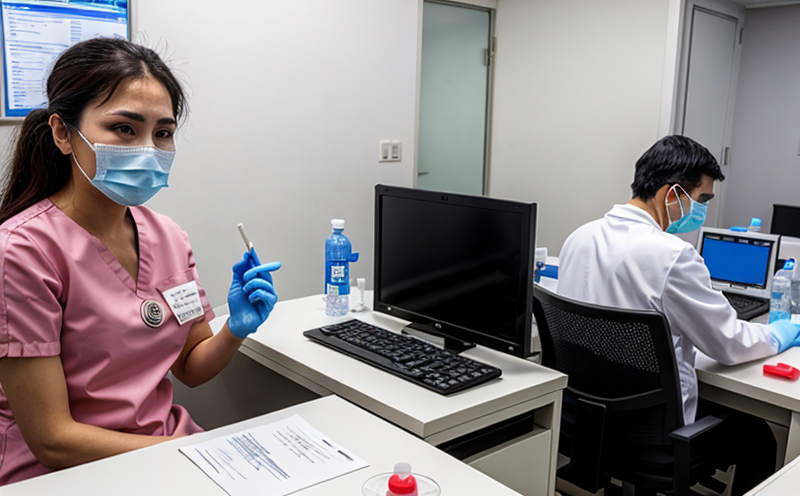Infectious Bursal Disease Virus (IBDV) Serology Testing in Poultry
Infectious Bursal Disease Virus (IBDV), a member of the genus Gammapodiviruses within the family Reoviridae, is an important pathogen affecting poultry. This virus primarily targets the bursa of Fabricius, an essential lymphoid organ in young chickens that plays a critical role in humoral immunity. The disease can lead to significant economic losses due to reduced growth rates, increased mortality, and poor immune responses. Serological testing for IBDV is crucial for diagnosing current infections, assessing herd health status, and monitoring vaccination efficacy.
Eurolab's IBDV serology test involves the detection of antibodies against IBDV using various immunoassay techniques such as ELISA (Enzyme-Linked Immunosorbent Assay). This method detects both IgG and IgA antibodies, which are indicative of past or ongoing infections. By analyzing these antibody levels in serum samples from poultry birds, we can determine the presence and extent of exposure to IBDV.
The test protocol begins with sample collection, typically using blood samples drawn via venipuncture. These samples must be carefully handled to avoid hemolysis, which would compromise the accuracy of the serological results. Properly collected samples are then transported to our laboratory for immediate processing. Once received, they undergo rigorous quality control checks before being analyzed.
Our skilled technicians use state-of-the-art equipment and follow standardized procedures to ensure reliable and reproducible results. The testing process involves incubation steps where the sample interacts with specific antibodies attached to a solid phase (e.g., microtiter plates). After washing, a detection reagent containing conjugated secondary antibodies is added, followed by color development using chromogenic substrates.
The final step in our IBDV serology test is reading and interpreting the absorbance values obtained from the spectrophotometer. These readings are compared against established cut-off levels to determine whether the bird has been exposed to or infected with IBDV. Positive results indicate past exposure, while negative ones suggest no detectable antibodies at the time of testing.
Our laboratory adheres strictly to international standards such as ISO 17025 for proficiency and accuracy in our diagnostic services. We also comply with relevant national guidelines issued by organizations like the World Organisation for Animal Health (OIE). By doing so, we ensure that all tests are conducted under controlled conditions ensuring high reliability and consistency.
Understanding the dynamics of IBDV within a flock is essential for effective disease management strategies. Regular monitoring through serological testing helps farmers make informed decisions regarding vaccination schedules, biosecurity measures, and overall farm hygiene practices. Early detection allows quicker intervention which can minimize the impact on productivity and welfare standards.
Applied Standards
| Standard | Description |
|---|---|
| ISO 17025:2017 | International standard for the competence of testing and calibration laboratories. |
| OIE Terrestrial Animal Health Code | The official reference document for veterinary public health worldwide, including protocols for diagnosing animal diseases like IBDV. |
| AAMI/ANSI/ISO 58680-3:2016 | Guide for the selection and use of serological methods in diagnostic laboratories. |
| ASTM E1479-18 | Standard practice for preparation, labeling, storage, handling, and shipping of biological specimens intended for testing or evaluation by a laboratory. |
| EN ISO 6580:2013 | European standard for the design, construction, operation, and maintenance of laboratories. |
| IEC 62366-1:2011 | International standard for medical devices—labeling requirements for in vitro diagnostic medical devices. |
Eurolab Advantages
Eurolab offers unparalleled expertise and advanced technology in infectious disease diagnostics, particularly focusing on poultry health. Our team of experienced scientists and technicians ensures that every sample processed receives meticulous attention from initial collection through final analysis. This commitment to quality is reflected not only in our adherence to strict regulatory requirements but also in the innovative approaches we employ.
One key advantage of Eurolab lies in our ability to provide rapid turnaround times for results, critical when quick decision-making is needed during outbreaks or routine health checks. Additionally, our comprehensive reporting options allow clients to tailor reports according to their specific needs, whether it be detailed technical data or simplified summaries suitable for non-expert audiences.
Eurolab also prides itself on its robust quality assurance systems, which include regular internal audits and participation in external proficiency testing programs recognized by regulatory bodies. This commitment ensures that our services consistently meet the highest standards of accuracy, precision, and reliability.
Competitive Advantage and Market Impact
In an increasingly competitive market where maintaining optimal flock health is paramount, Eurolab stands out for several reasons. Our IBDV serology testing service offers rapid turnaround times combined with highly accurate results, making it ideal for both routine monitoring and emergency situations. By providing detailed reports that are easy to interpret, we empower poultry producers to take swift action based on the latest data available.
Moreover, Eurolab’s involvement in setting industry benchmarks through our adherence to stringent quality standards contributes significantly to enhancing overall livestock health practices globally. Our work helps establish best practices for diagnosing and managing infectious diseases like IBDV, thereby promoting sustainable agricultural practices that benefit both producers and consumers alike.





